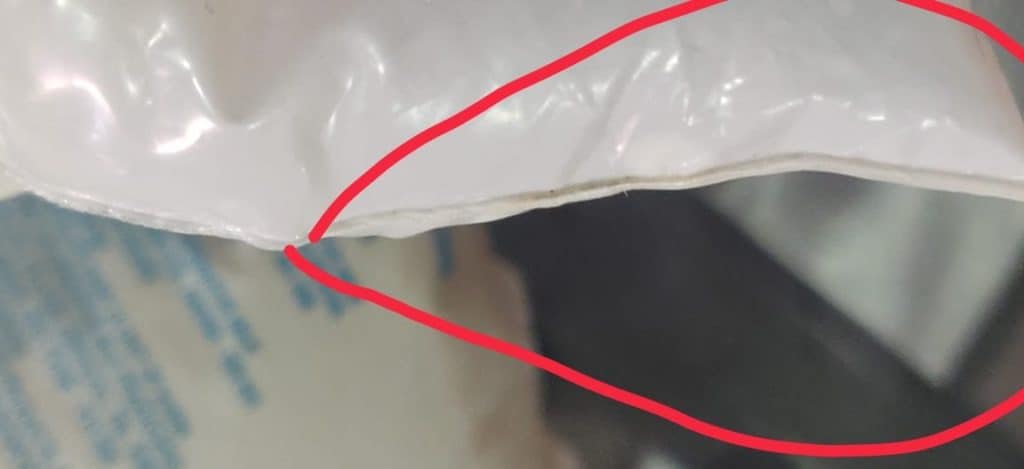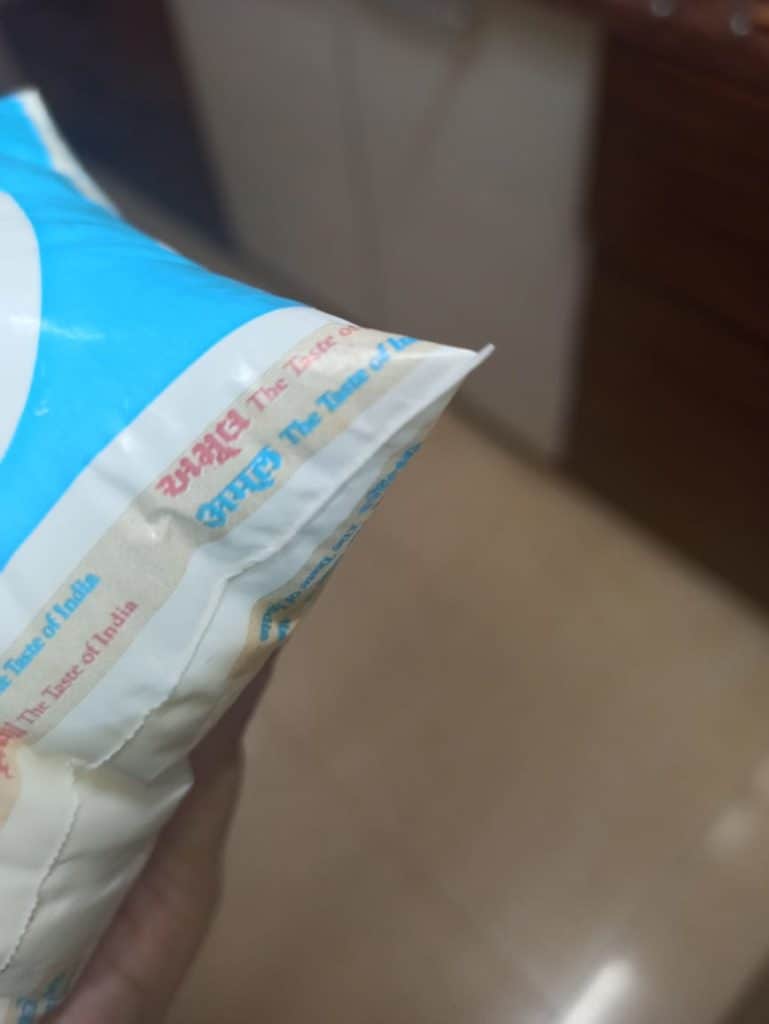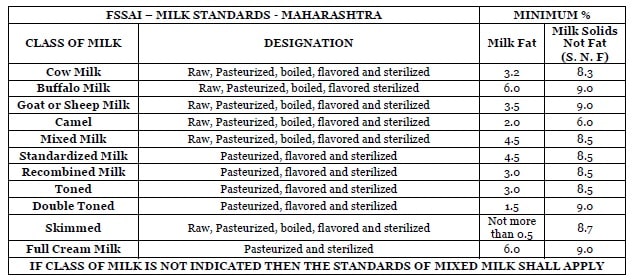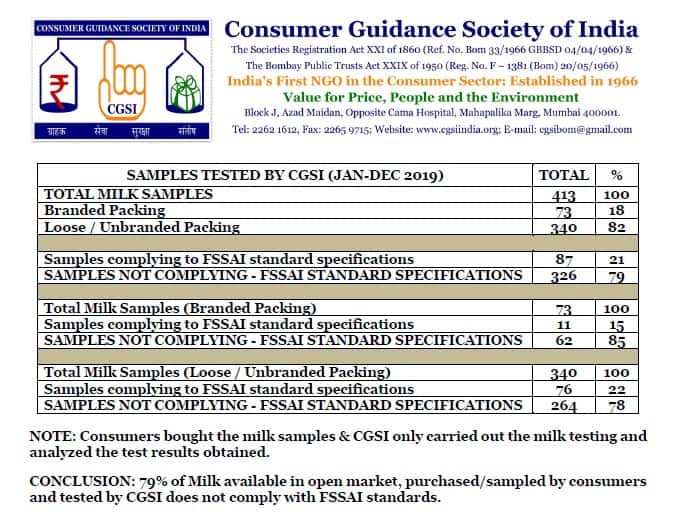The general perception is that branded packaged milk is better than loose/unbranded milk. Better because it would be processed and packed hygienically, would not have added water, and would be free from any other adulterants.
“Whoever is taking packet milk, please be careful. I received two packets today and it was quite clear that both packets had been resealed with fire. I called the milk supply person and he isn’t answering my calls.” Earlier this month, the residents of Lokhandwala Township, Kandivali East, received this message from a vigilant lady, along with pictures of the milk packets she had written about.

Soon everyone was checking their milk packets and several people reported a similar story on inspection. It was evident that the milk was being adulterated i.e. some substance was intentionally being added to it. People were distraught and started getting concerned about what the adulterants could be.
I heard people say:
“Don’t know what we have been drinking in the name of milk all these years.”
“Now I know why my curd quality was bad and never tasted the way curd should.”
“What has he been adding to the milk? Urea to washing powder, it could be anything. Hope it is just water.”
Read more: Beware! The milk you buy may not be safe enough

One lady who had recently shifted her house to a different locality said that the quality of the same brand of milk was so much better than what she was receiving while staying in the township, and now she realised why that was the case.
As it turned out, there were some people who had already discovered that there was a problem with the milk being delivered and they had quietly switched to other suppliers or alternatives to milk packets. Some of them said, “I had spotted a light cut and seal done on the packets so I discontinued, and I’m getting the same brand from an online supplier,” or “I stopped packet milk a long time ago. Though aware that Tetra Pak milk is not the same as fresh milk, I am very happy with it.”
‘Yes, your milk is adulterated’
In the midst of these discussions, some people suggested that the milk supplier be taken to task for supplying adulterated milk packets of reputed brands such as Amul, Gokul, Mother Dairy. Some were of the view that a police complaint be filed. One of the building societies who got wind of these discussions, called the milk supplier for a discussion and he confessed that he was supplying adulterated milk.
The milk supplier has been barred from entering some societies but nothing else has been done to bring him to book. He has the pre-paid coupon money of many households that he hasn’t returned. “I’ve paid for milk coupons for a whole month. I am wondering how I will get my money back,” one resident said.
He even had the guts to go to post-paid households to collect payment for the adulterated milk he supplied. “These people are mafia. We don’t have the time or energy to fight. He came for money so I paid,” said another resident. In general, people are fearful of the repercussions of filing a police complaint, and concerned that the ‘small fish’ will suffer while the big ones escape.
Milk standards in Maharashtra
FSSAI (Food Safety and Standards Authority of India) fixes the standards that milk should have to be fit for human consumption. Milk samples are tested to check whether they comply with the FSSAI standards or not. The two parameters measured are Milk Fat and Milk Solids-Not-Fat (SNF).
Adulterants alter the composition of the milk, so adulterated milk will usually not meet the prescribed standards.

Adulterated milk a norm?
79% of milk samples tested in Mumbai Metropolitan Region (MMR) by the Consumer Guidance Society of India (CGSI) in 2019 did not comply with FSSAI standards. The figures were 85% for branded milk and 78% for loose/unbranded milk. This, as per the CGSI Annual Milk Testing Report 2019.
CGSI is an NGO that has been guiding consumers since 1966. In order to create public awareness about the quality of milk that is in supply, CGSI tests milk on a regular basis by running consumer contact camps primarily in MMR. As per the 2019 report, 413 samples of branded and loose/unbranded milk bought by consumers were tested during the period Jan–Dec 2019. No report for 2020 has been released, but the year-on-year trend indicates that non-compliance has been on the rise.

Adulterants that could be added to milk
Water is the most common adulterant. It increases the volume – so adding it to milk can make 3 litres of milk into 4 litres. Normal milk already contains about 87% water, so who needs any more added to it? Though more added water seems harmless, it not only decreases the nutritional value and quality of milk but also exposes you to water-borne bacteria and viruses. With packaged milk, there are also the risks that come with repackaging.
Other adulterants that are usually a part of milk testing include: Vegetable oil/fat, Detergents/ Caustic soda, Hydrogen peroxide, Formalin, Sugar, Glucose, Skimmed milk powder, Salt, Urea, Starch, Maltodextrin, Boric acid, Ammonium sulphate, Nitrates, Cellulose, Neutralizers (such as NaOH, KOH, carbonates, bicarbonates, ammonia, various alkalis, etc.), Melamine, Oxytocin.
Scary, isn’t it?
All the adulterants, except Oxytocin, are wilfully added to the milk to reduce costs and/or increase profits. For example, Formalin is a preservative that improves the shelf life of milk and saves on refrigeration costs. Starch prevents milk from curdling. Glucose, sugar and salt add to the thickness of the milk that has been diluted with water. Detergents restore the foamy appearance of milk that diminishes when it is diluted with water.
Adulteration from Oxytocin happens at the cattle sheds. Oxytocin that is injected into milching animals to increase the milk yield, passes to humans through the milk.
Milk could have contaminants as well, that are tested for in the lab. Contaminants are not intentionally added, but these find their way through the food/water chain. They include: Pesticide residues, Antibiotic residues, Aflatoxin M1.
What will happen if you consume adulterated milk?
Natural milk has high nutritional content. At the base level, the impact of water adulteration is lower nourishment. You may think that you are drinking one glass of milk whereas you are actually drinking three-quarters of a glass of milk and one-quarter water.
Depending on the adulterating agent, the effects would vary. Consumption of adulterated milk on a regular basis has long term impacts on different organs of the body that may creep upon you gradually. For example,
- Detergent causes stomach and kidney problems.
- Urea causes a burning sensation in throat and chest, redness in eyes and skin, headache, nausea and vomiting, lung damage-fibrosis, etc.
- Formalin is highly poisonous and causes liver and kidney damage.
- Oxytocin is responsible for early puberty, development of breasts in boys, loss of memory, poor eyesight, abortion in pregnant women, deformities in unborn babies, etc.
How do you know if milk is adulterated?
There are a few simple things that you can do at home, to detect “milk fraud”.
Visual inspection
The most obvious is the visual check. Branded milk packets are from an automated production line because of which the packets are sealed very uniformly. Any irregular edges, resealed cuts, evidence of manual heat/fire sealing, indicates that the packet has been tampered with. Check that the pouch is cold and its four corners point outwards.
On the packet, there should be clear mention of:
Name and address of manufacturer
Type of milk
Net quantity
Expiry date
MRP
Nutrition table
FSSAI licence number.
Using a lactometer
A lactometer is a small device that measures the density of milk. This indicates the amount of water in the milk and therefore the purity. Just follow the instructions that come with the device.
Checking for different adulterants
Water adulteration – If you put a drop of milk on a polished slanting surface, if pure, the milk will stay or flow slowly leaving a white trail. Adulterated milk will flow immediately without leaving a mark.
Detergent adulteration – Put an equal quantity of milk and water in a bottle and shake it vigorously. Then pour it into a glass. Pure milk will have a small layer of foam on top while adulterated milk will have dense foam.
Starch adulteration – Boil an equal quantity of milk and water. Pour into a glass. Add a few drops of iodine tincture. Pure milk remains unchanged while the starch in adulterated milk makes it turn blue.
Urea adulteration – Take a spoon of milk in a small glass. Add half a spoon of soybean or arhar dhal powder. Shake thoroughly. After 5 minutes, dip a red litmus paper. If the litmus turns blue it indicates the presence of urea.
Most of the other adulterants are usually tested for in labs as they usually need chemical reagents that would not be readily available at home.
Suspect your milk is adulterated?
Adulteration of milk is a serious crime, so much so that it is non-bailable in Maharashtra. As a responsible citizen, any suspicion of adulteration should be immediately handled.
You may choose to report the case to the police for investigation. Call 100 or your local police station. Organised adulteration could involve a network of people that ends with the milk delivery person. Mumbai police is quite proactive in busting milk adulteration cases, the most recently reported one being in Feb 2021.
For branded milk packets, please file a complaint with the manufacturer. Every milk packet will have the customer care number and email address on the packet. You can talk to the executive and email your complaint, pictures of the milk packets and the name and contact number of your milk delivery person. The contacts below have been tried and they work.
- Amul Milk Customer Care : 1800 2583333, customercare@amul.coop
- Gokul Milk Customer Care : +91-22-40285650, vashi.mktg@gokulmilk.coop
- Mother Dairy Customer Care : 1800 1801018, consumer.services@motherdairy.com.
Samples can be sent for testing to Consumer Guidance Society of India (CGSI) – for water and SNF content. Tests for specific adulterants will need to be done in a lab. Test reports are to be filed with FDA. CGSI will guide you.
CGSI Helpline 1800 22 22 62 (Toll free), 022-22621612
FDA Maharashtra Helpline 1800 22 23 65
You can register your complaint on the FSSAI website.
FSSAI Helpline 1800 11 21 00, email helpdesk-foscos@fssai.gov.in
Stay vigilant. Don’t ever doubt that unadulterated milk is your right.
“When you’re really considering all the qualities of food, purity is right there at the top of the list. I’m unwilling to eat/drink food that has been adulterated.”
Alice Waters
References:
- Impacts of Milk Fraud on Food Safety and Nutrition with Special Emphasis on Developing Countries
- Common milk adulteration and their detection techniques
- 5 Simple Milk Adulteration Tests
- CGSI Annual Milk Testing Reports
Also read:
Thanks for publishing such an important article. I wholly understand the people who fear repercussions. I remember having read an a similar
article in a local tabloid published in Chennai, ‘DT Next’ a few years
ago. We used to mutter that milk supplied at our doorstep by the local
‘doodhwala’ or ‘milkman’ was diluted with milk. Those are the men behind this, I believe. Revolutions have come and gone, but people
Will not change.